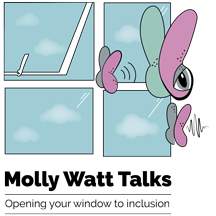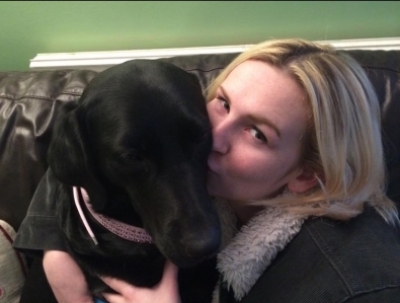Coming Out
It's always interesting to read how people with hidden disabilities tackle the whole "Coming Out" procedure.
For me it was a procedure. There was nothing natural about it.
Having been born deaf that had never really been an issue in fact while I was young my hearing aids were quite the fashion accessory. I chose bright coloured hearing aids and sparkly or funky coloured moulds each time I could change them. I was never embarrassed or shy about my hearing aids in fact when I was poorly and couldn't wear them I was devastated as I couldn't be like my friends, I couldn't join in, couldn't chat and felt sad and isolated, even having just one hearing aid wasn't like having two, I was unbalanced and felt left out - being deaf meant that to me.
Hearing aids made me deaf but able to fit in and I was cool with it.
However the onset of blindness to add to my deafness was not cool and now I felt very different!
Was it my age? I'd been born deaf so knew no different. Was it fear? I'd had perfect vision and used it to compensate for my deafness.
Why was it so different?
There is no equivalent to the hearing aid for the blind. Glasses cannot help my blindness. My blindness makes it harder for me to hear because we hear with our eyes - lipreading, body language and gestures all gone, the things I took for granted gone.
I guess it was a lot to take on board as a youngster, peer pressure, hormones and this, I just wanted to be like everybody else and get on with being young, seemed the easiest thing - just get on as normal!
Fitting in is important, we often forget who we are I suppose and I was comfortable with that accept I knew deep down I was different.
It was the easy option, pretend, make light of the many calamities of being deafblind - falling over, walking into people and things, not hearing, mishearing - laughing at myself.
I now know the only person I fooled was myself!
Then came the cane, I hated it from day one. I had proper training with both long and short cane - never quite got the point of a short cane and as for the long one, walking along swinging it from side to side was anything but blending in now I would stick out like a sore thumb.
From the day I was trained to use my cane I should admit to always carrying it folded in my handbag, I guess subconsciously I knew one day I'd have to use it!
The thought of looking disabled now pained me.
I'm not one for the sympathy vote and the very thought made me cringe.
I then tried to stay in my comfort zone which I now know caused me to isolate myself. That said I was able to access the outside world remotely, I was lucky enough to have a MacBook which became my main link to my friends.
Unless I was with somebody I wouldn't leave the house unless I really had to.
The so called break came when I was matched with my gorgeous Guidedog Unis but again it meant "Coming Out" and it wasn't easy to start with and made even harder by the way I was treated - "You don't need a Guidedog" "You were fine yesterday, why the dog today" "You can use the Guidedog but only when we say it's ok" "You don't look blind" - I cannot tell you how much mental trauma that caused me, damned if I do and damned if I don't.
Such ridiculous comments, let's face it a Guidedog costs in the region of £50,000 so why would I be given one without the need - they are not a fashion accessory but a mobility aid, for me a more desirable one than the cane.
It took me a long time to accept deafblindness and its daily challenges including mobility problems.
Today I would not for one moment be without Unis, she is everything to me our bond stronger than ever and I've even made up with my cane - we won't ever have the bond Uni and I share but when I cannot use my faithful four legged friend I have no problem taking out my cane.
Acceptance is tough but along with it comes empowerment. I still love my MacBook because it allows me access to so much including people like myself all around the world, however, I am no longer a prisoner to Usher Syndrome.
I am passionate about raising Usher awareness and in helping others come to terms with the many issues we face.
I want those around us to accept us for who we are and to appreciate our unique abilities and talents, we have so much to offer but before we can be who we really are we must be honest with ourselves..



